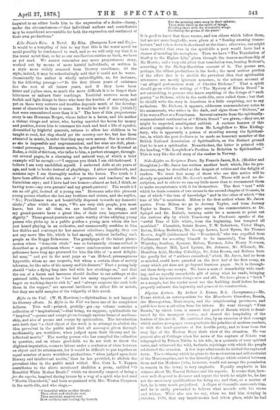Riffs in the Veil. (W. H. Harrison.)—Spiritualism is not happy
in its literary efforts. In Rifts in the Veil we have one of its completest failures. This well - printed, prettily - got - up volume contains a collection of "inspirational,"—that being, we suppose, spiritualistic for 4' inspired"—poems and essays given through various forms of medium-
ship, and also of poems and essays by spiritualists. The introduction sets forth that "a chief object of the work is to attempt to abolish the idea prevalent in the public mind that all messages given through raediumship are worthless, when judged upon their literary and in- tellectual merits." The worthy person who has compiled the collection in question, and on whose good-faith we do not wish to throw the slightest imputation, seems to labour under a confusion of ideas between an object and its attainment, for it would be difficult to put together an
equal number of more worthless productions, " when judged upon their literary and intellectual merits," than he has provided, to abolish the prevalent idea in the public mind withal. Mrs. Cora L. V. Tappan contributes to the above mentioned abolition a poem, entitled " 0 Beautiful White Mother Death !" which we shrewdly suspect of being a feu des esprits, inspired during trance by a wag of a spirit who had road "Martin Chnzzlewit," and been acquainted with Mrs. Weston Chapman in the earth-life, and who sings,— " 0 beautiful white mother Death! Thou silent and shadowy soul, Thou mystical, magical soul Bow soothing and cooling thy breath Ere the morning stars sang in their spheres, Thou didst dwell in the spirit of things. Brooding there with thy wonderful wings, Incubating the germs of the years."
It is good to know that these verses, and ten others which follow them, but are not more laughable, wore given at a " Sunday evening trance- lecture," and taken down in shorthand at the time ; otherwise, one might have expected that even in the spirit-life a poet would have had a chance of mending his metaphors. Then we have "The Translation of Shelley to the Higher Life," given through the trance-mediumship of Mr. Harris ; and a very odd affair that translation was, boating Bottom's, according to the Shelley-Harrisian account of it. The poems are, perhaps, the silliest productions in the book ; the most serious portion of the effort that is to abolish the prevalent idea that spiritualist utterances are mostly ignorant nonsense, is the solemn account of "an alleged post-mortem work of Charles Dickens." That a spirit should go on with the writing of " The Mystery of Edwin Drood " is not astonishing, to persons who know anything of the doings of " such gentry" as Dickens, while in the earth-life, once called them ; but that ho should write the story in American is a little surprising, not to say audacious. Mr. Dickens. it appears, addresses commendatory notes to his amanuensis, who writes in the dark, and signs them " Dickens," as if he were a Peer or a Frenchman. Several extracts from the spiritually- communicated continuation of " Edwin Drood " are given,—they are, as might bo expected, unmitigated rubbish. A curious feature of this absurd compilation is a letter from Mr. Longfellow to Miss Kisling- bury, who is apparently a person of standing among the Spiritual- ists, in which the poet declines to be made an honorary member of the British National Association of Spiritualists, on the distinct ground that ho is not a spiritualist. Nevertheless, the letter is printed with the heading, "Mr. Longfellow's Position in Relation to Spiritualism." This is very like the old story of the snakes in Norway.


































 Previous page
Previous page